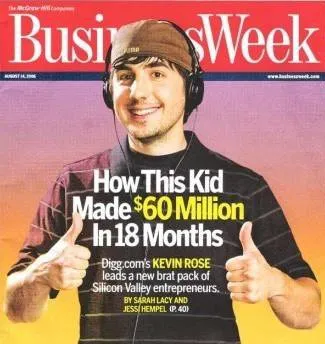This post was written by @cryptobarry 6 months ago. He didn't stick around. Perhaps he predicted the predicament we find ourselves in today.

TLDR:
The most important recurring problem throughout Digg’s existence was content manipulation by powerful users, or groups of users. This was considered unfair by the average user and led to frustrated people abandoning the site for greener pastures. Steemit also has a group of powerful users. We must encourage these ‘Whales’ that transparency and fairness should be their number one priority on Steemit and the mass of users beneath them must remain vigilant to keep them that way. They must be constantly reminded that fair play is in their best interest, and that they hold the keys to everyone’s shared success.
Many Steemians probably remember Digg.com. From 2004 to 2010, Digg was a popular link aggregator, a proto-Reddit, where users could up-vote their favorite news or articlelinks. At one point, the user base was almost 40million and the future looked bright. But something went terribly wrong. Digg went into a death spiral in just a few short months and its 200 million dollar valuation nosed dived to five hundred thousand dollars almost overnight. The company made some terrible choices, one of which was isolating its passionate user base, and when things went south, they doubled down causing one of the most spectacular internet implosions in the last 10 years. Here’s what happened.
Rise of a social media brand

What set Digg apart was that it gave users the ability to up-vote their favorite content by ‘Digging up’ or down vote or ‘Bury’ content they didn’t like. I know this doesn’t sound very special but ten years ago this was not a common user experience. Back then, most news sites fed content directly to viewers. Controversy came early during the rise of Digg, as early as 2005, when a top user was forced to resign after accusations that he was on the company payroll. Still, Digg continued to see explosive growth and by 2006 had millions of dedicated users but this was also when some of those users began to manipulate Digg to their benefit.
Sound familiar?
On June 26, 2006 Digg version 3 was launched, it had a few problems, but this is probably how most people remember the site. It was to remain in version 3 for over 4 years, and it is generally considered by former users as ‘the good years’ but the site continued to be plagued by controversy.
Flagging System
One of the first things implemented to the outcry of Digg users was the adding of a ‘report article’ feature on February 2, 2006. If enough logged in users ‘flagged’ an article as inaccurate, it would be removed from the queue. How many flags needed to bury a story was never divulged and it was immediately used in a way in which it wasn’t intended by some users.
Controversial viewpoints or articles that didn’t fit the top users’ social or political narratives, would immediately be flagged as inaccurate and disappear. This especially frustrated conservative and fringe users who would see their articles buried because they were unpopular with certain factions of the user base. It led to the alienation and many users abandoned the website for a little known website called Reddit. Reddit, a user generated link aggregator, would become the sanctuary for many disenfranchised Digg users over the next few years.
This would be fine if it were just minnows. Whales have a financial incentive to behave in ways that benefit the user base - if that keeps users engaged and the platform growing. Guilds... Do guilds (or I should clarify, delegated voters) suffer the same repurcussions if they never had to buy STEEM to upvote themselves to trending?
Digg Army Saga
On April 20, 2006, the founder of Digg banned dozens of top users for vote rigging. Many of these top users had created a voting bloc that would only up-vote each other’s content on mass, so that they would have a better chance at reaching the front page. The scandal broke when forevergeek.com user MACGYVER posted some screenshots that showed that the Top 100 Digg users controlled 56% of the front page content. It also implicated Kevin Rose, somewhat, because his up-vote was usually included in posts that The Digg Army also up-voted.
Whether he knew about this group or not, Rose responded by banning most of the offenders. This proto-brigading, a problem that seriously plagues Reddit today, pissed off thousands of users who abandoned Digg, once again, for Reddit. Digg version 3 is released a couple months later.
@ned, @donkeypong, @steemship, @sweetsssj, @hanshotfirst, @the-alien, @gavvet, @jrcornel, @blocktrades, @ats-david, @clayop, I know that this name dropping shit is a bitch but I really want to ask you all personally to take a step back and really look at what YOU are doing or NOT doing rather than pointing fingers every direction that points away. This name dropping list could be a lot longer so I'm sorry to those tagged if you feel personally attacked by this post. Some of you may deflect the notion that you're part of some guild or group, but if you have "friends" who auto-upvote each other and you have no qualms about putting the same people on the trending page every day, be that yourself or your friend, well... here's what we can look forward to.
User rebellion against more vote rigging
The Digg army scandal didn’t even have time to cool, that users on mass rebelled against the new ‘Friends’ feature and further vote rigging. Users railed against the friends system because it created powerful blocks of top users and made it very hard for new users to gain any traction on the site. It also enabled spammers to add thousands of friends frustrating users further. The Digg team promised change to the algorithm to make the system fairer to new users and various tools to fight spam but none of this was ever materialized. On April 20, 2006, another top user named P9, caught up in the scandal, resigned and again, many users abandoned Digg for Reddit.
All of this has happened before and all of this will happen again...

Scandals continued to haunt Digg over the years. On October 3, 2008 a small group of top Digg users were again banned for failing to follow the TOS by using scripts to manipulate content. These kinds of issues continued to plague the website and the shit finally hit the fan with release of Digg version 4.
The Downfall
On August 25, Digg released version 4 of their website. The new version was completely broken and filled with bugs and glitches. While the Digg team, including CEO Kevin Rose, doubled down on their new site wide upgrades, more voting manipulation by power users was exposed. Again, the power users were caught controlling content that reached the top by up-voting each other’s submissions. This coupled with the glitch filled mess that was version 4 led to a massive user revolt.
Users organized a ‘Quit Digg day’ on August 30, 2010 and flooded the site with links from Reddit.com. I remember this day well, for the next two weeks the Digg front page was filled with nothing but links to Reddit. This event led to a mass exodus of Digg users to Reddit, a platform people felt was fairer, and one of its main selling points was its ‘anything goes attitude in regards to content.
Things began to fall apart quickly. On September 1 Kevin rose stepped down as CEO to be replaced by Matt Williams. On October 27, Digg laid off 37% of its high turnover staff and less than 4 months later on March 17, 2011 Kevin Rose leaves the company he founded. Just over one year later Digg is sold to Betaworks for a deep discount of $500,000. The company, who at one time was courted by Facebook, had lost 95% of its valuation in a matter of months.

Why Digg Failed
The most important recurring problem throughout Digg’s existence was content manipulation by powerful users, or groups of users. This was considered unfair by the average user and led to frustrated people abandoning the site for greener pastures. Steemit also has a group of powerful users. We must encourage these ‘Whales’ that transparency and fairness should be their number one priority on Steemit and the mass of users beneath them must remain vigilant to keep them that way. They must be constantly reminded that fair play is in their best interest, and that they hold the keys to everyone’s shared success.
Thank you @cryptobarry for trying. Unfortunately we didn't listen.